Text

“…the Graces bathed her with heavenly oil such as blooms upon the bodies of the eternal gods—oil divinely sweet, which she had by her, filled with fragrance. And laughter-loving Aphrodite put on all her rich clothes, and when she had decked herself with gold, she left sweet-smelling Cyprus and went in haste towards Troy, swiftly travelling high up among the clouds”
- Homeric Hymn V, to Aphrodite. Hugh Evelyn-White, tr.
My contribution to the Sing, O Muse! Greek Mythology zine in all of its glory depicting Aphrodite being tended to by the Charites in her temple. Let’s get into it.
Historically speaking, the Charites aren’t ever really given individual characteristics. If you’ve ever seen a painting or a statute of three naked ladies hanging out, you’ve seen the Charites But they are so much more!
Algaia, meaning “shining” is the goddess of adornment. She is also the wife of Hephaestus so I wanted to make her the most blinged out (apart from Aphrodite). She’s the one holding the mirror.
Thalia means “blooming”. She’s typically associated with festivities, but given her name and the context of the illustration I tied her more to fragrances. She’s wearing a myrtle crown (one of Aphrodite’s sacred plants) and holding an alabastron (a vessel for perfumes).
Euphrosyne, meaning “merriment” is the goddess of good cheer. I didn’t really have anything that could tie into how that would help Aphrodite get ready, so she’s just fixing the hem of her mantle.
We also have many of the Erotes appearing in the decorative tiles of the background. They serve as personifications of various forms of desire. From left-to-right, the visible Erotes are:
Anteros, or unrequited love holding a club and scales.
Hymenaios, representing the wedding ceremony holding a torch.
Eros, in his role as a representative of procreation holding a hare and foreshadowing Aphrodite’s seduction of Anchises and the subsequent conception of the hero Aeneas.
Himeros, representing desire and holding a tainia (hair ribbon)
Hedylogos, representing sweet talk, playing an aulos
Make sure to check out Sing, O Muse! A Greek Mythology Zine Illustrating the Homeric Hymns, featuring my work as well as sixteen other very talented artists!
262 notes
·
View notes
Text
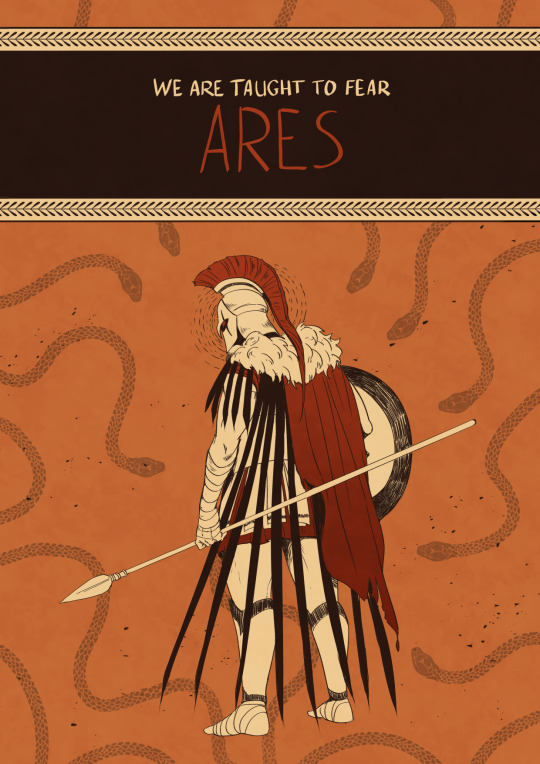
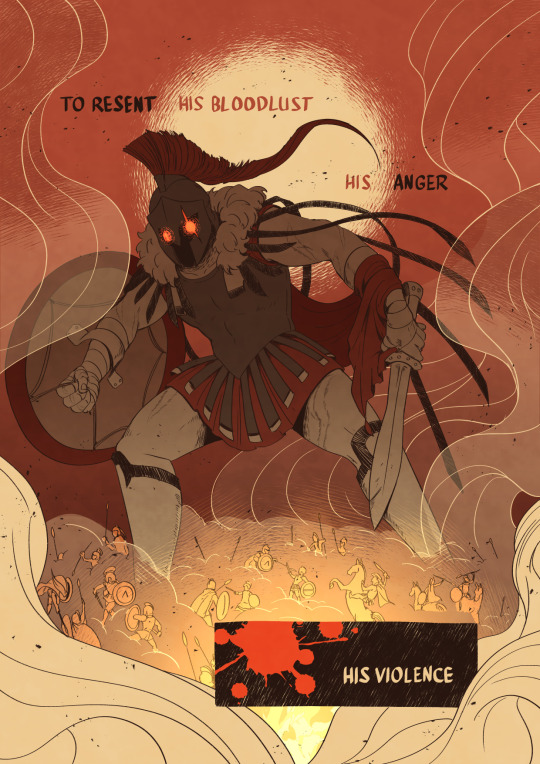
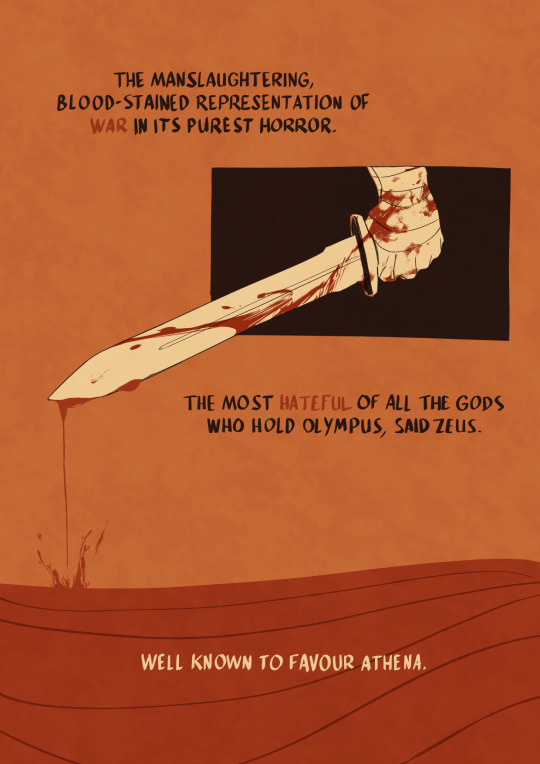
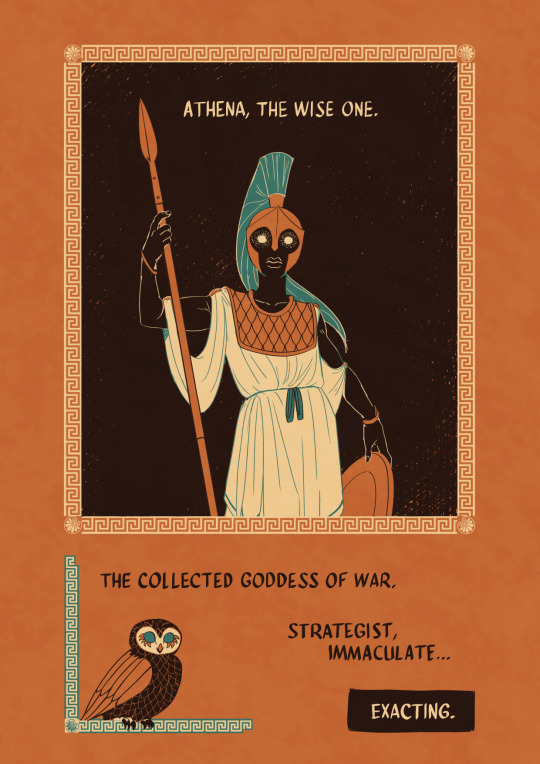
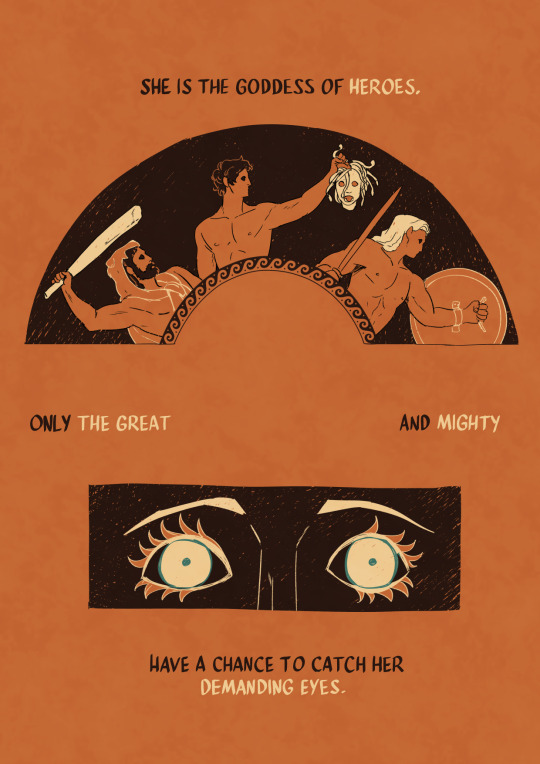
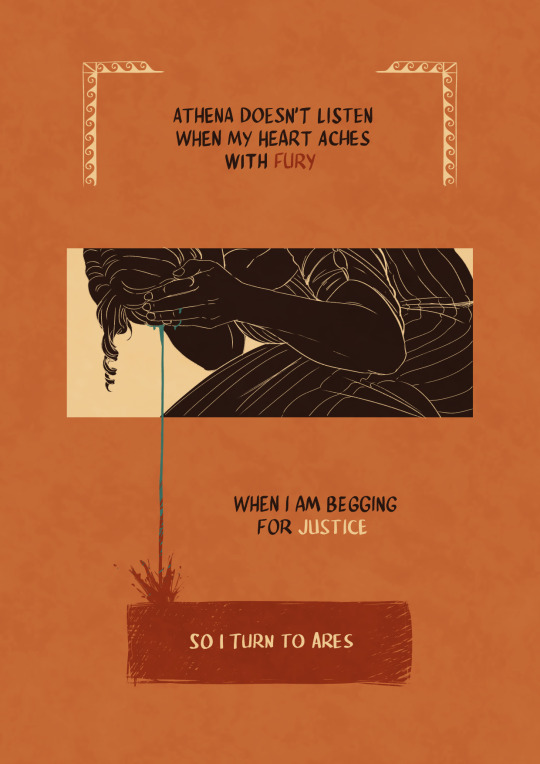
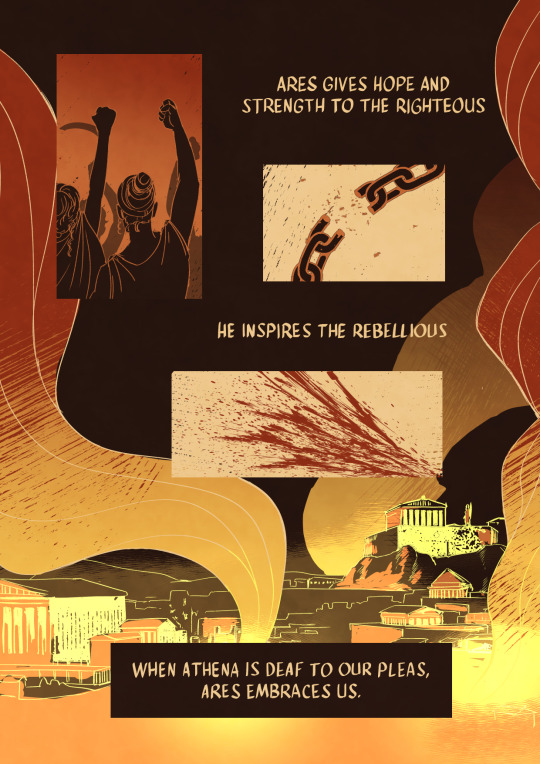
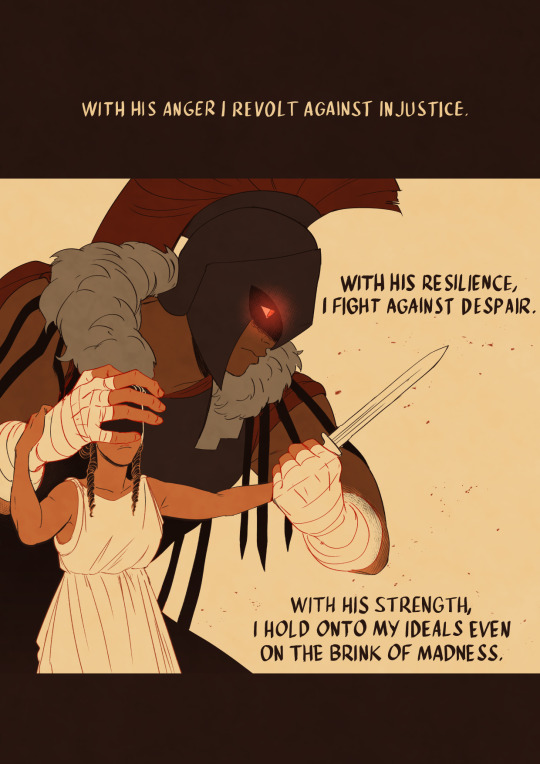
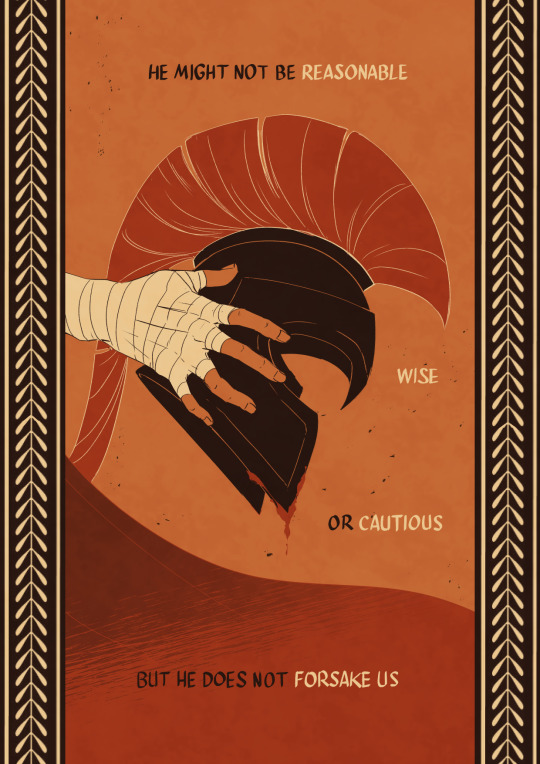
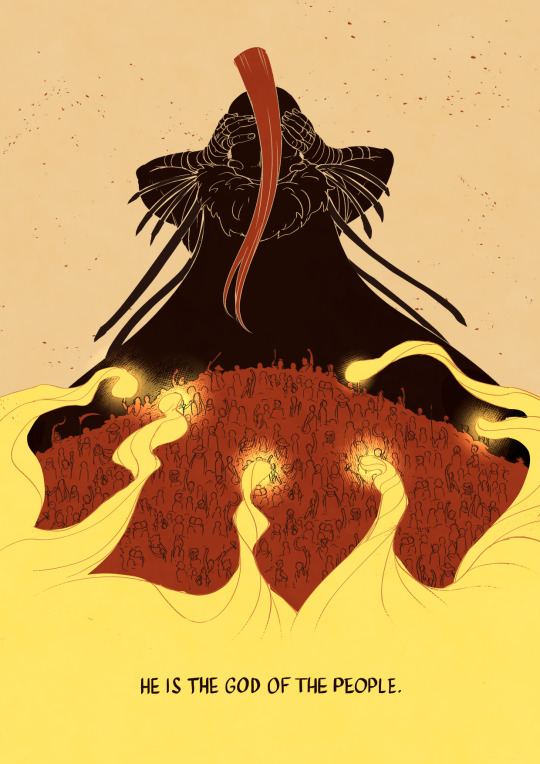
I turn to Ares.
Thanks to Tyler Miles Lockett who allowed me to draw inspiration from his ARES piece for page 2! Look at his etsy page it's SICK
⚔️ If you want to read some queer retelling of arturian legends have a look at my webtoon
74K notes
·
View notes
Text
now that I think about it, I could probably have done the comparison between Iphigenia and Electra -- since Euripides wrote a version -- if I wanted to do plays we read in class, but I'd already written about Electra in a previous paper about Aeschylus' Oresteia, and again on comparing the three Electras so I was kinda tired of her after that, unfortunately
also I know this is off topic -- I'm not usually a fan of modern adaptions, but Wole Soyinka's The Bacchae of Euripides was my favorite of ones we read this semester. The Island by Athol Fugard, John Kani, and Winston Ntshona is another one I can wholeheartedly recommend
cannot say the same for Satre's The Flies as an adaptation of Antigone because I fundamentally disagree with existentialism so those were not fun discussion days for me, but others in the class did enjoy it, so personal preference, honestly
going through Iphigenia at Aulis again for my final paper of the semester, and have an interesting passage that I came across while looking for quotes --
Achilles: When I witness the nobility of your soul
I yearn all the more for your love.
So listen, I long to help you.
I long to win you for my home.
Thetis is my witness, it will be my loss.
if I do not check the Greeks and save you.
Remember, death is a terrible thing.
Iphigenia: Without misgiving, I must say this:
Helen the Tyndarid has done enough harm by her beauty
in whipping up strife and making men shed blood.
Therefore, good stranger prince,
do not die for me. Kill nobody.
Allow me to save Greece if I can.
Achilles: O illustrious one,
what more can I say if that is your decision?
Your whole attitude is wonderful. That is the truth.
Nonetheless, should you change your mind,
this I want you to know:
I shall put my weapons at the ready by the altar
to rescue you from dying.
Perhaps you will take my offer up
when you see the sword come near your throat.
I shall never let you die for a ridiculous decision.
I’ll take take these weapons of mine to the temple of Artemis
and await you there.
#I did a presentation on The Bacchae by Euripides and I have a couple of JSTOR articles I found interesting on the topic somewhere#I am a running faucet on the topic today because I am Stressed
13 notes
·
View notes
Text
#no joke though op#what is your thesis on?
ah, my paper is on Euripides portrayal of Iphigenia in both at Aulis and Among the Taurians -- both the time between the mythic events and the context of Euripides's life itself has an effect on the difference in tone and character behavior. Among the Taurians was written towards the middle of his career, where Aulis is among the last, alongside The Baccahe and the lost Alcmaeon in Corinth. Paul Roche in his introduction before Among the Taurians says that Iphigenia means 'strong borne one' (the copy I'm using is the Signet Classics edition of Euripides Ten Plays -- as an aside, I highly recommend since it denotes the different Choral Odes and sometimes even has translation notes) and you can really see it in Aulis. Among the Taurians Iphigenia is weaker, but only in comparison to herself in Aulis
or at least that's the crux of it -- I mention these topics in the paper itself, but you could easily delve into each separately:
-- the reversal of roles between Agamemnon and Iphigenia, with Agamemnon being hesitant and pushed to commit the sacrifice where Iphigenia is steadfast and determined
-- you can look at Iphigenia and the sacred statue of Artemis among the Taurians in a similar way, since Iphigenia was brought there via wind and the statue just kinda dropped down from the sky one day, and Orestes was sent to retrieve the statue by Apollo, Artemis's brother
but we had to do a comparison of plays and it only had to be 6-8 pages, so perhaps I might keep those topics in mind for another class...
going through Iphigenia at Aulis again for my final paper of the semester, and have an interesting passage that I came across while looking for quotes --
Achilles: When I witness the nobility of your soul
I yearn all the more for your love.
So listen, I long to help you.
I long to win you for my home.
Thetis is my witness, it will be my loss.
if I do not check the Greeks and save you.
Remember, death is a terrible thing.
Iphigenia: Without misgiving, I must say this:
Helen the Tyndarid has done enough harm by her beauty
in whipping up strife and making men shed blood.
Therefore, good stranger prince,
do not die for me. Kill nobody.
Allow me to save Greece if I can.
Achilles: O illustrious one,
what more can I say if that is your decision?
Your whole attitude is wonderful. That is the truth.
Nonetheless, should you change your mind,
this I want you to know:
I shall put my weapons at the ready by the altar
to rescue you from dying.
Perhaps you will take my offer up
when you see the sword come near your throat.
I shall never let you die for a ridiculous decision.
I’ll take take these weapons of mine to the temple of Artemis
and await you there.
#apologies for rambling I just been thinking about it a lot#and the paper is due tonight so talking about it does actually help even if I've moved on from the section in question
13 notes
·
View notes
Text
going through Iphigenia at Aulis again for my final paper of the semester, and have an interesting passage that I came across while looking for quotes --
Achilles: When I witness the nobility of your soul
I yearn all the more for your love.
So listen, I long to help you.
I long to win you for my home.
Thetis is my witness, it will be my loss.
if I do not check the Greeks and save you.
Remember, death is a terrible thing.
Iphigenia: Without misgiving, I must say this:
Helen the Tyndarid has done enough harm by her beauty
in whipping up strife and making men shed blood.
Therefore, good stranger prince,
do not die for me. Kill nobody.
Allow me to save Greece if I can.
Achilles: O illustrious one,
what more can I say if that is your decision?
Your whole attitude is wonderful. That is the truth.
Nonetheless, should you change your mind,
this I want you to know:
I shall put my weapons at the ready by the altar
to rescue you from dying.
Perhaps you will take my offer up
when you see the sword come near your throat.
I shall never let you die for a ridiculous decision.
I’ll take take these weapons of mine to the temple of Artemis
and await you there.
#I wonder how people who know Achilles through fandom and/or tsoa would think about this passage#or honestly just the play in general#because it paints Agamemnon is a very sympathetic light#Menelaus on the other hand...#and Odysseus is explicitly called a demagogue he's certainly not coming out this looking very good at all#not tagging because I don't feel like dealing with people who might take this as an opportunity to fight#I don't mean to come off as antagonistic -- it is meant in entirely genuine curiosity
13 notes
·
View notes
Text
I was mistaken. my presentation is May 2 so it's really something closer to 2 and a half weeks. however, I got most of it done today, so all I really need to do is poke around JSTOR for sources for evidence
I have a presentation on Euripides The Bacchae in just under a week and a half. I, knowing the myths far too well, have decided to give the background information for Cadmus's founding of Thebes as well as Dionysus's birth. I am once again so deeply thankful for theoi.com
7 notes
·
View notes
Text
I have a presentation on Euripides The Bacchae in just under a week and a half. I, knowing the myths far too well, have decided to give the background information for Cadmus's founding of Thebes as well as Dionysus's birth. I am once again so deeply thankful for theoi.com
7 notes
·
View notes
Note
Hey yo congrats On eleven years I have a question what mythical creature can be the archenemies of a werewolf besides from vampires and witches?
I'm pretty sure I made my first account back in 2011, but I lost access to years ago so it's Gone, and for the most part, I don't mind, but I will admit I wish I had a record of the post I made on December 21, 2012. I remember how I felt, but it still would've been interesting to have, you know?
as for your question -- I'm gonna be honest, I have never understood the feud between werewolves and vampires. if you go back far enough they’re nearly indistinguishable, it's really only modern depictions that have made them so vastly different
also, perhaps I am taking this a bit too literally, but witches aren’t mythical creatures
but if I were to entertain the question -- revenant, specifically because they sit at the intersection between the werewolf and the undead/vampire
#you can make an argument for both angels and demons too#depending on whether the werewolf was the result of divine punishment or was a Saint
5 notes
·
View notes
Text
had the realization yesterday during Greek Drama class that the story of Oedipus Rex is that of a king who goes from a metaphorical blind fool to a literal blind philosopher
we also talked a lot about the tension between fate and free will, and how the play reads remarkably like a mystery story, which in my opinion is quite interesting
7 notes
·
View notes
Text
this blog had its 11th birthday a little while ago apparently. because I lost my first account, this is my oldest blog, even if I haven't been active here sometimes
4 notes
·
View notes
Text
@lioness--hart re: your tags on Anat: #the fact that there is a god of love and war is so cool#the fact that she is female is even cooler
I have good news for you! this isn't as uncommon as you might initially think!
to start with, keeping to Mesopotamia, we have both Ishtar and Inanna! Inanna is from Sumer, and Ishtar is her Akkadian, Babylonian, and Assyrian counterpart. and of course we have Astarte for the Phoenicians and Canaanites
we can also see the association of both love and war in Egypt with the synchronization of Sekhmet (war and disease + healing) and Hathor (fertility and love). in fact, they are two sides of the same goddess in later periods
in Laconia, Greece, Aphrodite is a warrior herself. in Sparta, Aphrodite holds the epithet of Areia or warlike
for Rome, Venus has the epithet of Victrix, the Victorious. while there is a higher emphasis placed on Venus's role as mother of Aeneas and subsequently mother of Rome, there tends to be an undercurrent of either agriculture or war to any god they worshiped, so in a roundabout way, Venus is associated with both love and war
and lastly, turning north, among the Norse, Freyja's domains include love, sex, beauty, and war
the mythological association of love and war is quite interesting. after all, as the saying goes, all is fair in love and war
16 notes
·
View notes
Text

Anat the Canaanite goddess of sexual love, war, and hunting. Progenitress of heroes, lady of Palestine.
Info on each sketch below:
Top right: Anat is shown here in a man's war kilt and her hair pulled up, a nod to the Anat statue head found in Gaza. This is after Baal Hadad's 'death', with her cheeks gouged by grief and face painted to resemble a man's beard. This beard imitation combined with her topless clothing and the horned headdress she wears is to evoke a sense of Baal having risen from the dead to claim revenge.
Bottom Right: An exploration of her musculature, with a focus on the markings on her hips and stomach. Drawn from female Canaanite fertility idols that show similar markings with a lot of emphasis on the navel/bellybutton.
Bottom Left: Anat at the feast of Baal's new palace. She wears expensive, imported Egyptian linens. Her hair is braided, eyelids darkened with kohl, and hands darkened with henna.
Center: Anat's fullbody with lots of influence from historical Palestinian dress. She is shown with a vulture because Aqhat, killed at her order, was eaten by vultures and because Anat is often shown with wing imagery.
1K notes
·
View notes
Text
the thing about Fate is that even the gods are subject to it -- for all her anger and efforts, even Juno, Queen of the Gods, can do naught be delay Aeneas from reaching his destination. and what's worse is that she loved Carthage, and if she hadn't meddled, Dido wouldn't've thrown herself on a pyre in her heartbreak when Aeneas, ever faithful and mindful of his Fate, left her. if Juno hadn't interfered, if she hadn't convinced Venus to make her son and the ruler of Juno's own favored city fall in love, the bad blood between Rome and Carthage might not have been first spilled
20 notes
·
View notes
Text
perhaps I should get a better mic than just my headphones or computer so I can record myself reading ancient literature. if I want people to have access to audio of Greek tragedy, perhaps I should endeavor to make it myself
5 notes
·
View notes
Text
in a mythological sense, Tiamat is fascinating to me. because as a goddess, she represents the salty primordial waters, her consort Abzu also primordial water but her opposite as fresh from underground
in this aspect, Tiamat is a creator goddess. it is her children who ultimately bring out her wrath, as they turn against Abzu and kill him. in retaliation, Tiamat takes Kingu (a child of Abzu and Tiamat) as her consort and thus begets monsters. here, we see Tiamat take on her role as mother of monster, more of a destructive force rather purely creative. it is only when the storm god Marduk, son of Enki, steps up that she is slain. using Tiamat's body, Marduk makes the world
and this is what fascinates me about Tiamat: even in her rage, even at her most destructive, even in death, Tiamat is a creator
turning to her appearance, Tiamat is described as a dragon, yes, but also as a sea serpent -- really, she looks more like Jormungandr or perhaps a salamander than a standard western dragon
#Mesopotamian mythology#mythology#Tiamat#I must admit I am not fond of DnD's portrayal of Tiamat#think of her like a combination of Ymir and Jord from Norse mythology
21 notes
·
View notes
Text
fun fact! Kratos is referenced in Aeschylus's Libation Bearers:
"Let Power [Kratos], Justice [Dike], and Zeus the Third, / mightiest of them all, stand at your side." translated by Peter Meineck, Libation Bearers, lines 244-5, second play of The Orestieia
this particular line is said by Elektra, who is addressing her brother, Orestes, right before he goes to kill their mother, Clytemnestra, in revenge for killing their father Agamemnon, himself the son of King Atreus
thinking about God of War and names --
do they know of the legacies they bear?
Kratos, named for a son of Styx and Pallas, brother of Nike, pledged to the Olympians during the Titanomachy, strength and might personified
Atreus, who was named no trembles, fearless, an innocent boy with a name steeped in the blood of kin
#it took me a minute to register Kratos because Meineck used the English translation of his name#but there we go!
24 notes
·
View notes
